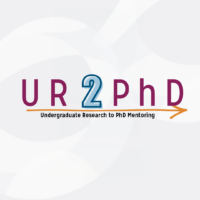UR2PhD is Positively Shaping the Research Pipeline – And You Too Can Get Involved!
By Erik Russell, Director of Educational Initiatives, and Julia Sepulveda, Senior Program Associate, CRA-E
In 2023, the Computing Research Association’s Committees on Education and Widening Participation (CRA-E / -WP) developed and launched the Undergraduate Research to PhD Mentoring (UR2PhD) program to increase the percentage of women and other gender-marginalized students graduating with PhDs in CS from 23% to 30%. To meet its objective, the UR2PhD program specifically focuses on increasing the number of undergraduate research opportunities for women and closing the gap between a student’s first research experience and a successful PhD application.
UR2PhD is strengthening pathways into computing by offering virtual programming that empowers undergraduates, graduate students, and faculty mentors.
In recognition that students who have a positive undergraduate experience participating in research are much more likely to pursue doctoral studies in computing, UR2PhD offers virtual activities that make it easier and less time consuming for faculty and graduate students to offer experiential learning opportunities to undergraduates. Amongst those activities, the UR2PhD team offers an undergraduate research methods course that helps students learn and apply research skills, a graduate student mentor training course that provides mentors with guidance for developing interpersonal relationships in a research environment, and a series of workshops that educate and empower students about research careers, pathways, and graduate education.
UR2PhD is positively influencing undergraduate participants and those that work with them.
To date, the UR2PhD team has had more than 230 undergraduate students across two cohorts participate in its research methods course. And according to early data collection, participants are benefiting from the experience. 92% of surveyed undergraduates in the research methods course indicated that they would like to pursue an advanced degree, with 46% planning to achieve a doctoral degree.
UR2PhD is not only changing the way that undergraduates see themselves as researchers, but is also supporting faculty mentors and departments to advance their research. Nearly all surveyed mentors indicated that the course was successful in their research engagement with students. Christelle Scharff, a faculty mentor at Pace University, shared: “The research course integrated perfectly in our summer initiative in undergraduate research. Students could get a comprehensive introduction to literature review and apply the methodology on the topics they worked on. The program permitted us free time to focus on advancing the research.”
UR2PhD plans to continue to offer program activities; we encourage prospective computing researchers and faculty mentors to get involved.
Looking ahead, UR2PhD plans to offer the research methods and graduate student mentor training course again in the fall of 2024. If you’re interested in participating in future iterations of the courses, we plan to offer them again in the spring, summer, and fall next year.
Participants for the program are sourced through two primary avenues: institutional partnership and student applications. Institutional partners are departments that are committed to scaling the quality and scale of research opportunities available locally. Applications for institutional partnership are accepted on a rolling basis, year-round. Student applications for the spring will open later this fall; to view an example of what is expected students can refer to the fall application.
We encourage all faculty members to consider working with 2-4 new undergraduate researchers. The semester-long investment in the program will greatly reduce the amount of time required to get the students on-boarded into research. And if successful, can help you advance your research goals.
For more information about UR2PhD and the courses, we recommend visiting cra.org/ur2phd








